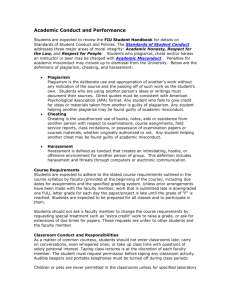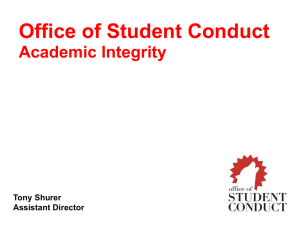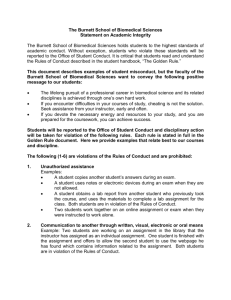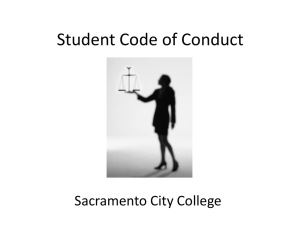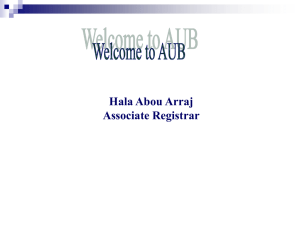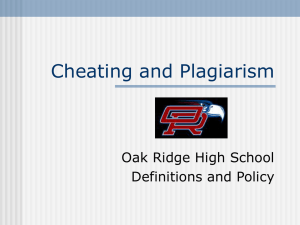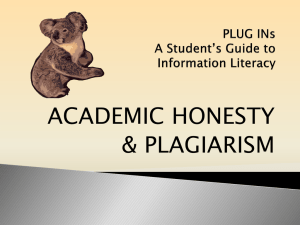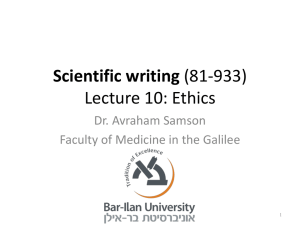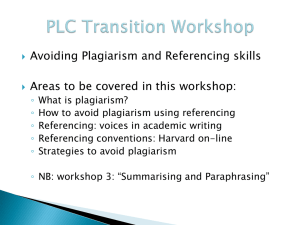How Should We Respond to Plagiarism and Other Forms of
advertisement
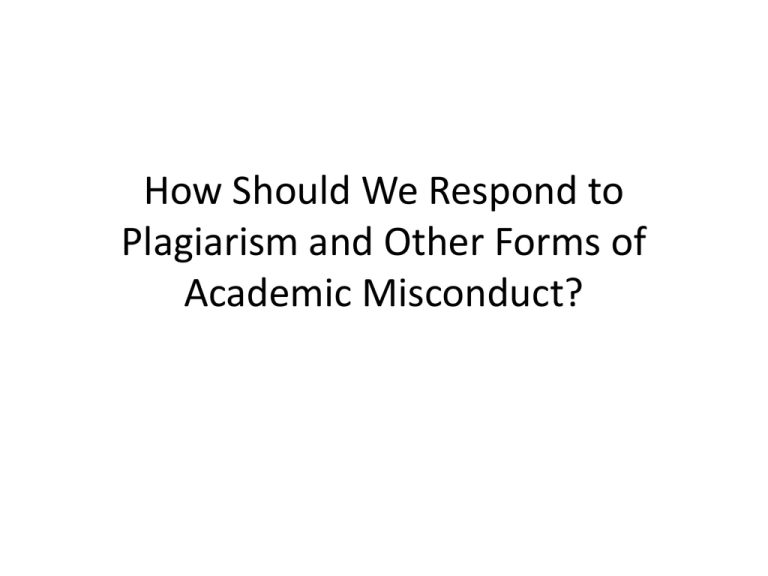
How Should We Respond to Plagiarism and Other Forms of Academic Misconduct? On-Going National Conversation with Sense Problem is Growing • Nationally – – 70-80% of undergraduates say they have cheated Reasons Often Mentioned • • • • Internet access to papers and information Pressure to succeed Sense peers are doing it Belief that there is low chance of getting caught – And punishment is minimal Why Did You Cheat or Plagiarize (CSB/SJU) • • • • • • 45.2% 44.2% 31.8% 27.9% 25.9% 21.8% Under time constraints Wanted to get good grade Pressured to help friend Easy to cheat What some consider cheating, I don’t I didn’t think I would get caught – SJU 27.2%; CSB 17.4% CSB/SJU • How frequently do you think plagiarism occurs at your institution? – 14.1% – 46.0% – 37.6% – 2.1% “always/often” “occasionally” “rarely” “never” CSB-SJU • How frequently do you think cheating on tests occurs? – 9.0% – 35.8% – 49.65% – 5.4% “always/often” “occasionally” “rarely” “never” Have You Ever Been Informed about the Academic Integrity or Cheating Policies? • 88.8% -- Yes • 4.9% -- No • 6.1% -- Don’t remember • 87% say they learned in classes Academic Dishonesty Filings with Dean – SJU only • • • • • 2007-8 2008-9 2009-10 2010-11 2011-12 22 23 39 42 39 (9/13) (12/11) (32/7) (25/17) (23/16) FY Students (?) v. Others • 94 of 165 cases (57%) were in 100 level courses • 55 of the 94 cases (58%) in 100 level courses were in the Fall Filers by Area- 100 level courses F2007-S2012 (SJU only) • • • • • • • • THEO 111 29 CSCI 1xx 13 FYS 1xx 11 PHIL 1xx 10 HIST 1xx 8 ACFN 114 3 BIOL 1xx 3 11 other 14 Old Plagiarism Policy • “Plagiarism can result from either deliberate dishonesty or ignorance of citational procedures. Deliberate plagiarism is especially serious and warrants more severe sanctions, but even plagiarism based on ignorance of procedures is a punishable offense, especially when it occurs more than once.” New -- Distinction between Academic Misconduct and Poor Scholarship • PS – “inadequate understanding of scholarly conventions…or inability to implement those conventions…” • AM – “…by the intent to deceive, by gross verbatim use or limited alteration of another’s work accompanied by explicit or implicit claims that the work is the student’s own…” Penalty for Poor Scholarship in New Policy • “An appropriate penalty, therefore, is the same as for any other situation in which students fail to achieve the goals of a course: a reduced grade for the assignment in question and further instruction to remedy the deficiencies demonstrated by the student.” Reactions to new policy? • Improvement? • Concerns? • Grey areas? How Do We Know the Difference? • If a student lifts a couple of sentences from the class text with no quotation marks, is that poor scholarship or “gross verbatim use…of another’s work accompanied by explicit or implicit claims the work is the student’s own?” What Should We Do with First Time Poor Scholarship Offender • Recommendation is lower grade and re-teach What Should with Next Offense? • What if the student turns in another paper with poor scholarship in the same class? • What if in a subsequent class of ours? Questions Prior to Declaring Academic Misconduct • Has the student received instruction in the Institution’s policy and how to avoid misconduct, plagiarism, and poor scholarship? • Was there intent to deceive? • Does the incident represent a pattern of misconduct? • Was the incident sufficiently egregious to warrant penalty? Suggestions for Countering the Problem • • • • Affirm value of academic integrity Don’t tempt them Clarify what is acceptable, esp group work Develop meaningful assignments, engage students • Negative aspects of hard line stance (Karon) Teach it! • Resources – Fostering Integrity in Research Page – http://libguides.csbsju.edu/research_integrity • FYS Plagiarism Power Point Papers Based on Class Material • Make paper topic course/reading specific – Emphasize need to integrate class readings/discussion into answer • Change some readings and/or question or rearrange prompt so old versions don’t fit Research Paper • Avoid “do it and turn it in” • Topics connected directly to specific class – Faculty approval – Do not allow late change • Require results in stages – Thesis statement, lit review/bibliography, outline, draft
